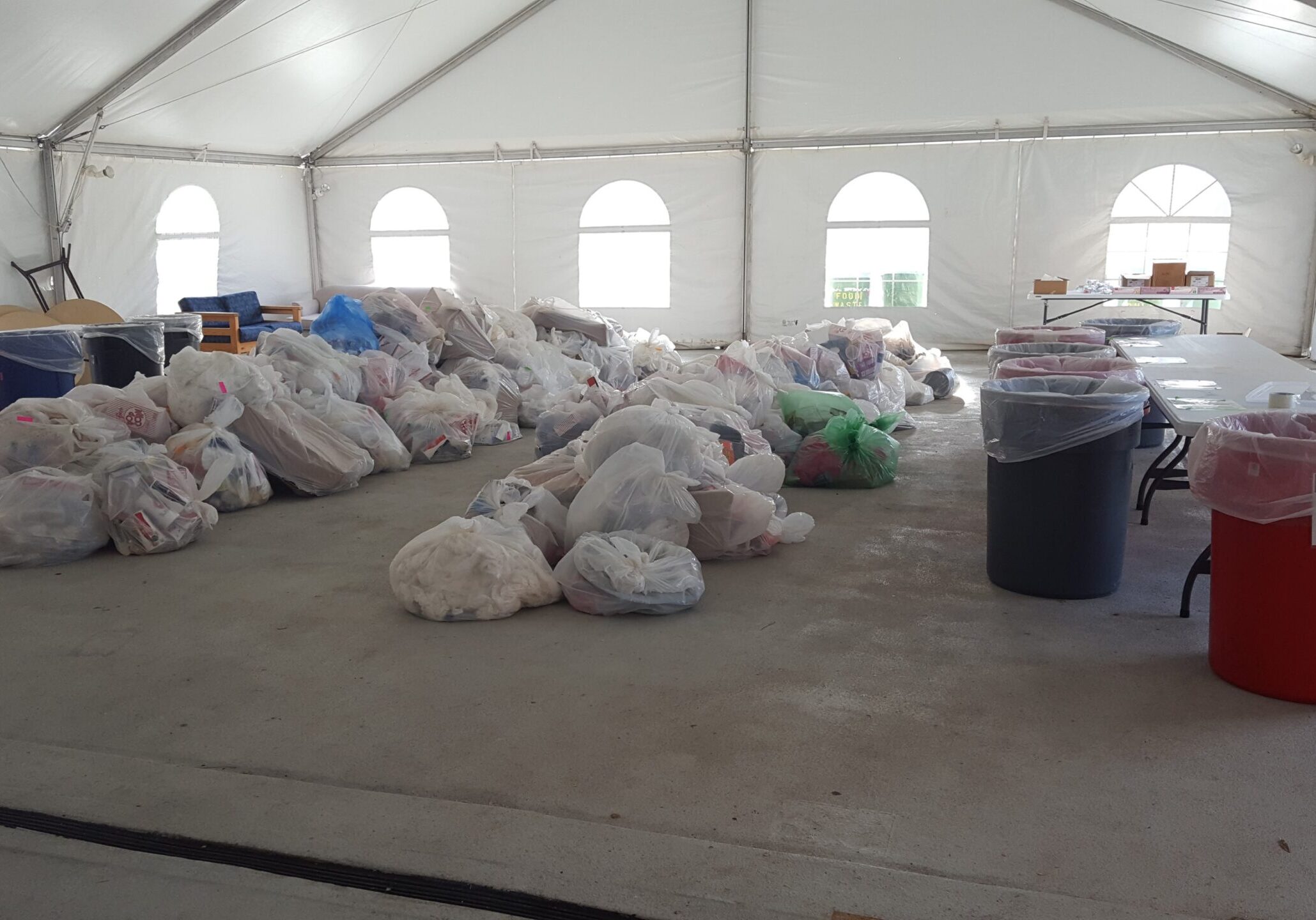
Waste Audit Case Study
University of Richmond 'Rethink Waste' Basketball Game
Too much waste and the lack of landfill space are complex global issues that cannot be solved overnight. The truth is, we can all make changes to our daily habits to separate our waste and send less material to the landfill each and every day. We partner with organizations of all sizes to proactively implement landfill diversion programs to combat these types of environmental issues.
We have seen mountains of trash come from behind the scenes of sporting events, where packaging materials, food, drinks, and giveaways are being disposed of, placed in trash compactors, and hauled away to the landfill. By sharing our expertise and technical assistance, we’re helping our clients lessen their environmental impact by engaging their fans and staff to collect clean, compostable, and recyclable materials. One area we have chosen to specifically focus on is, in partnership with the University of Richmond, increasing overall landfill diversion by targeting sporting events.
How did we do it? As a team! We all worked together, our team of professional trash talkers, the Athletics Department, Facilities, the Office for Sustainability, and the student body to identify what could be fixed, and how to get it done.
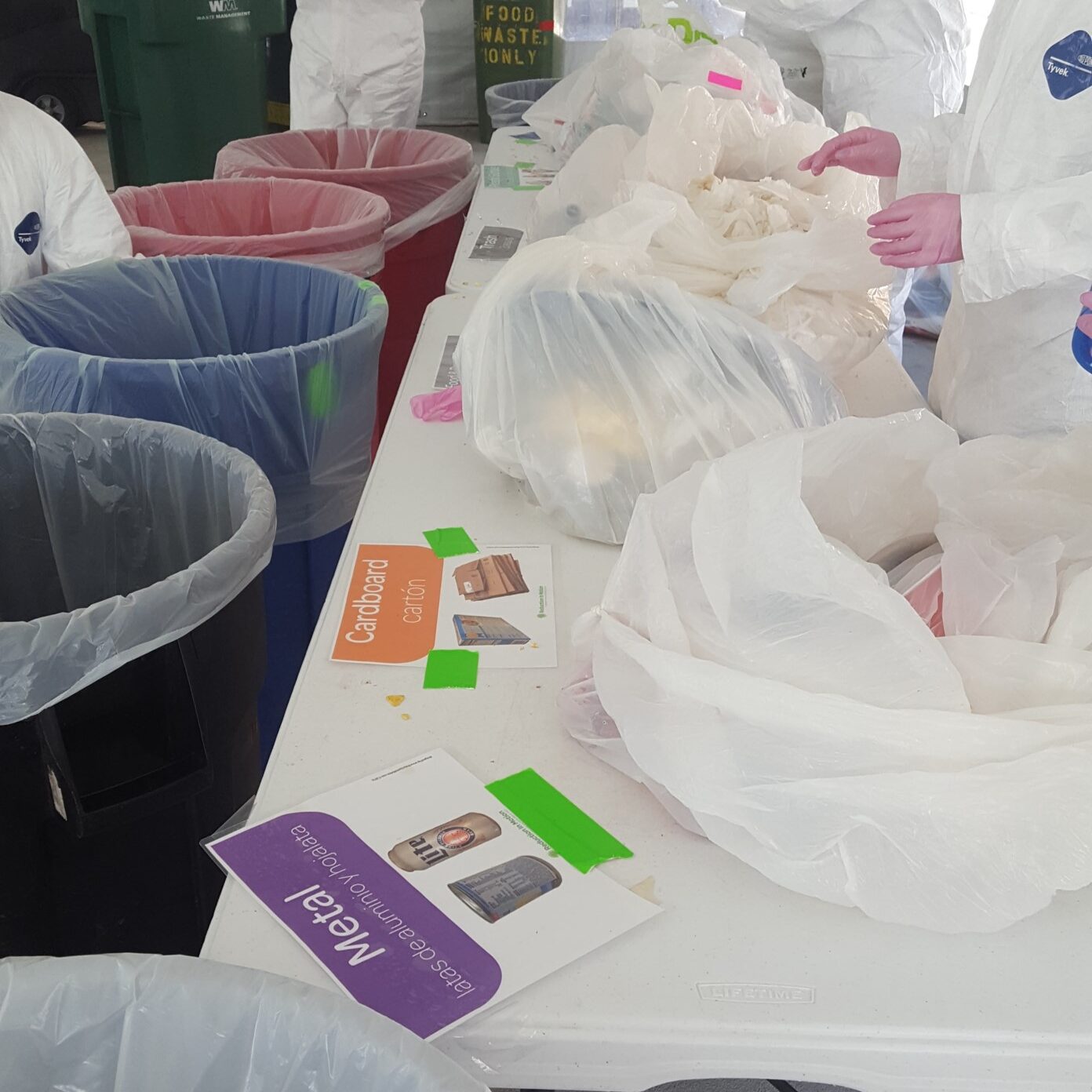
The Waste Audit Process
How did we do it? As a team! We all worked together, our team of professional trash talkers, the Athletics Department, Facilities, the Office for Sustainability, and the student body to identify what could be fixed, and how to get it done.
It all started with a game day waste audit completed during one of the University of Richmond’s men’s basketball games. The results of this initial audit told us where we needed to focus: devise a plan to collect recyclable materials cleanly and implement the collection of clean compostable materials. Together, we helped plan and coordinated the Rethink Waste men’s basketball game in February 2017. By implementing simple changes, we are proud to share University of Richmond achieved a landfill diversion rate of 87%.
Waste Audit Tips
Introducing Compost Collection
- Introducing the collection of compost throughout the stadium was imperative to increase the overall landfill diversion rate.
- Selecting a compost vendor that could collect both food waste and compostable wares was important to increase the volume of acceptable material designated as composting.
- Sourcing compostable-wares such as food containers, paper cups, lids, bag liners that were compostable helpful further reduce total material sent to the landfill
Location, Location, Location
- If waste separation is not easy for fans, it isn’t pretty- which was clearly identified in the initial waste audit.
- By pairing the existing trash and recycling bins, and establishing the collection of compost, we were able to create temporary ‘sort centers’ for easy disposal of all three waste streams in one location.
- With better container placement, waste separation compliance increased.
Color-coding
- Since existing containers were reused for the Rethink Waste event, it was essential to create customized labels and signs. Labels were placed on the cans and signage was hung on the wall above the bins to clearly differentiate which types of materials belonged in each bin.
- Additionally, by using color-coded bags for each waste stream so housekeeping staff could easily distinguish between waste streams during collection and transportation. Move forward, blue bags will be used for recycling, green compostable bags for compost, and clear bags for trash (landfill).
Engaging Vendors, Students, and Fans
- All outside food vendors were notified of the Rethink Waste game plans and were asked to replace current service ware with compostable ware.
- Bright green t-shirt with the newly designed Rethink Waste logo were given away for students volunteering at the Rethink Waste games.
- Student volunteers, wearing their new green t-shirt were trained and located at each of the sort centers to engage and educate fans on proper waste disposal throughout the game.
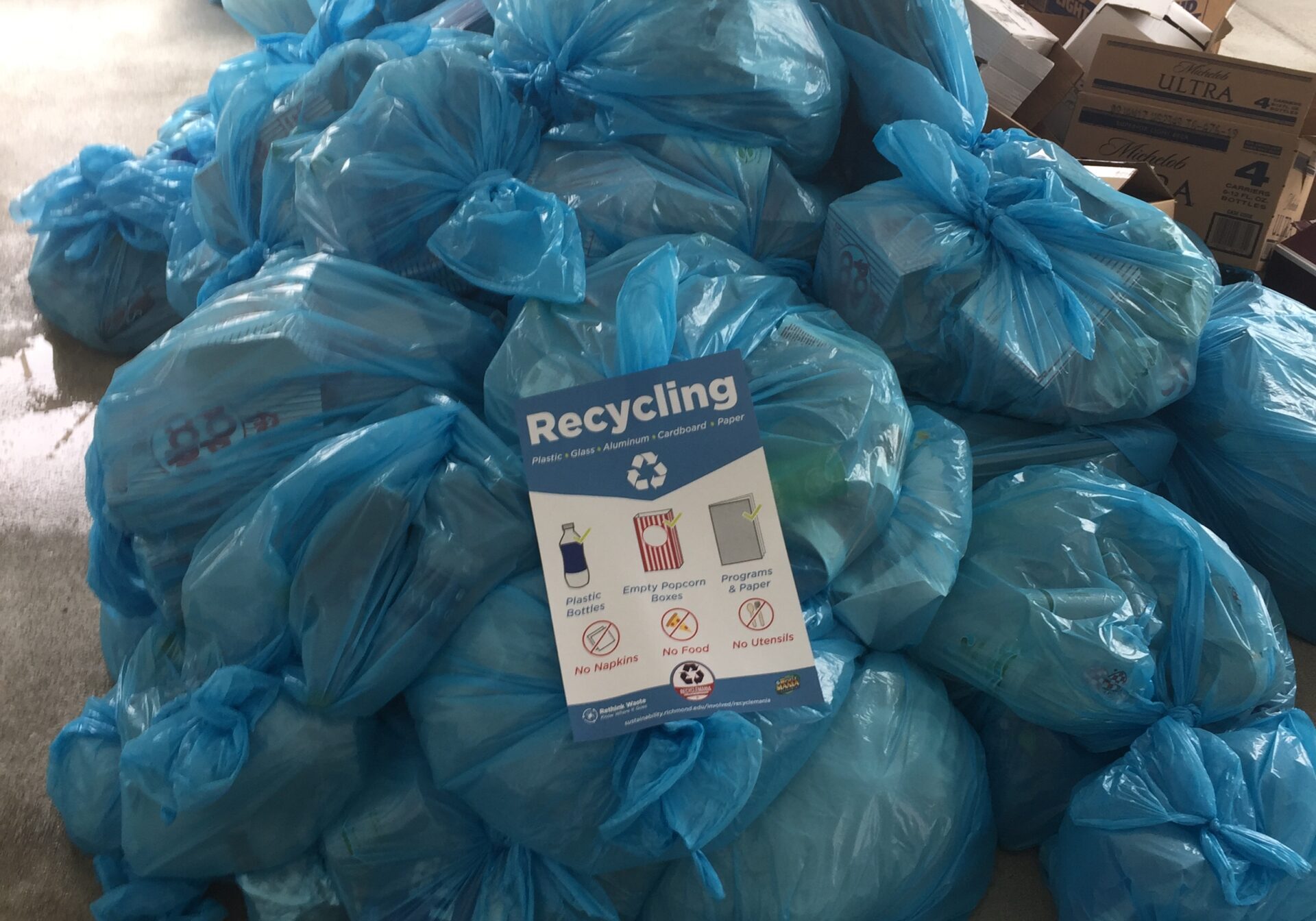
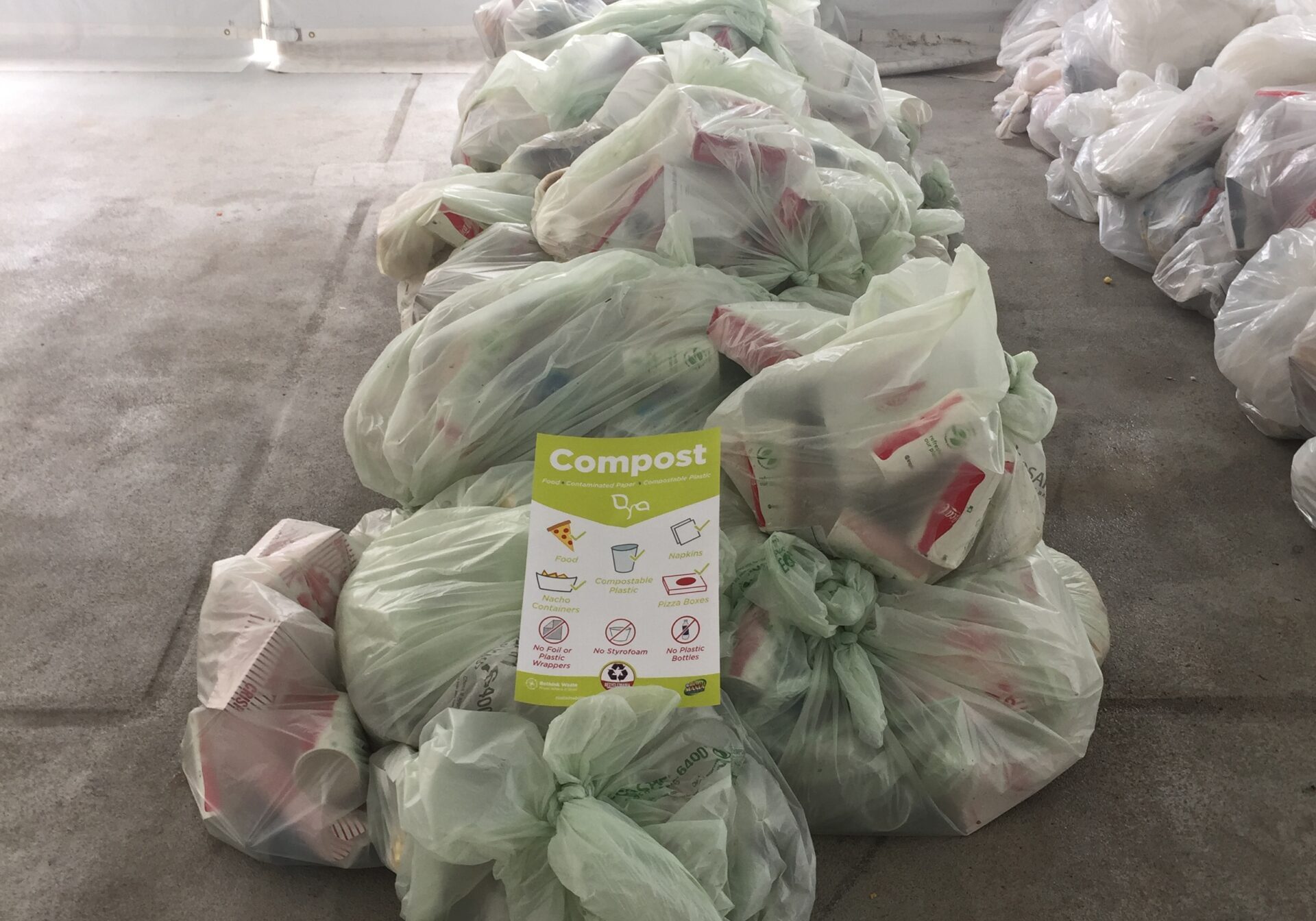
Lessons Learned
- In a perfect world, brand new three-stream sort containers would be placed throughout the stadium to collect recycling, compost, and landfill materials. In the meantime, we were still successful when we reused existing containers- however they key is creating color-coded labels and signage with samples of what items belong in which waste stream. By no means, should the fancy (and expensive) bins stop you from starting your waste diversion program.
- Compostable wares are a bit pricy, but that’s often the cost of doing the right thing. There was a 29% increase in spend in compostable wares when compared to the standard non-compostable (or recyclable) disposables. However, this change in purchasing only increased total potential compostable rate by 7% when comparing baseline to post-implementation waste audits.
- Although some compostable wares were purchased for this event, not all disposable wares could be replaced. Based on the waste audit findings, the outstanding non-recyclable, or non-compostable service wares identified included wipes, napkins, cutlery, etc. To further reduce waste sent to the landfill, environmental preferred purchasing is key, ensuring material can be disposed of in either recycling or compost, and therefore are diverted from the landfill.
- Although the focus for this event was primarily for front-of-house collection with fan engagement, it is also imperative to coordinate proper waste separation training with concessions and other vendors staff, so they can better impact landfill diversion rates.
The following year, University of Richmond took the lessons learned from this basketball game and translated them to their football stadium as they hosted their first official University of Richmond Rethink Waste football game in October 2017. They plan to continue working through the challenges of collecting clean material as well as hosting additional Rethink Waste sporting events in the years to come.
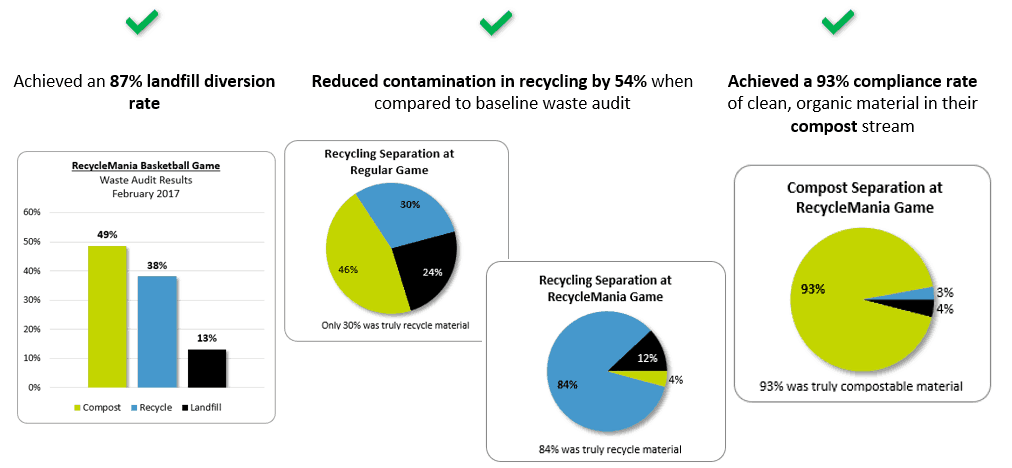
How We Helped
The Rethink Waste games encompassed only one aspect of University of Richmond’s comprehensive waste analysis, with support from us. In 2016, their administrators recognized the importance of becoming a more sustainable operation and set a goal to increase landfill diversion campus-wide. To fully evaluate all the aspects that go into maximizing the amount of waste they divert from the landfill in their daily operations they hired our team of professional trash talkers to help get the ball rolling in the right direction.
Here is what we did to help:
- Created a detailed analysis of waste bin infrastructure
- Reviewed all waste collection practices
- Conducted multiple waste audits
- Developed solid waste bin standards campus-wide
- Recommended best practices for organic waste collection/composting
- Evaluated alternatives for achieving UR’s 80% Waste-to-Landfill
- Monitored and tracked of progress
- Provided insight into a buyer’s guide for zero waste products for use in dining and events
- Supported the creation of a zero-waste events guide for departmental use
- Supported with education and outreach
